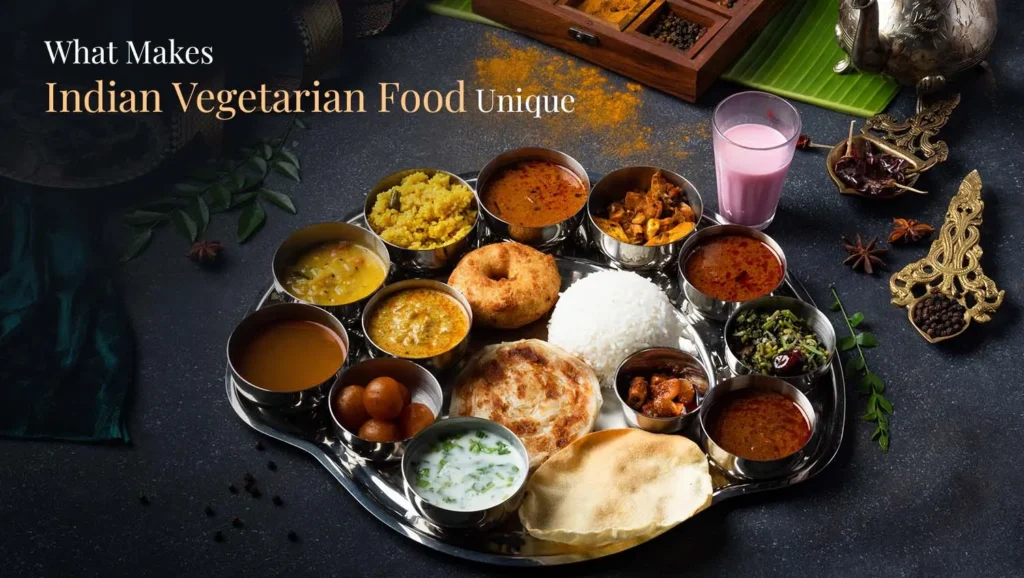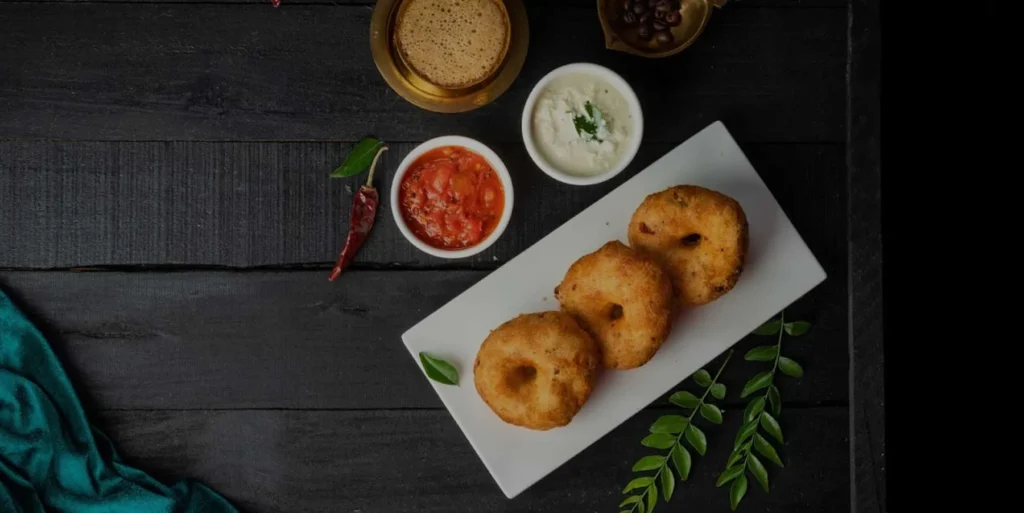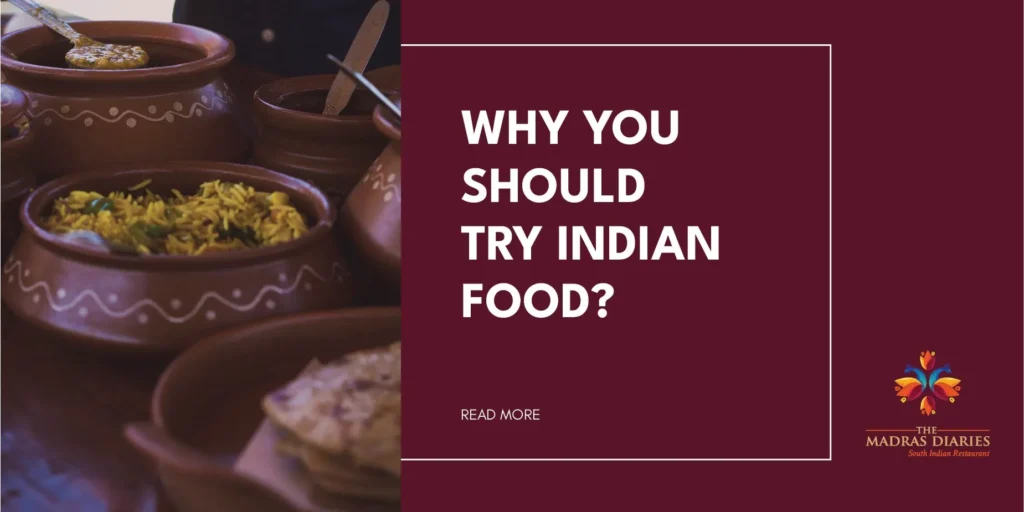Indian cuisine, without a doubt, is a paradise of vegetarian dishes. From the simple, light Dal Makani to the creamy rich Malai Kofta, Indian foods have the power to tantalise every taste bud it touches.
Built on the foundations of the ancient tradition, Indian vegetarian cuisine is a satisfying journey of flavours, textures and aroma. The regional varieties and indigenous ingredients mark the rich diversity.
So, come with us to witness how Indian vegetarian food comforts your heart and soul.
Why Indian Veg Cuisine Stand Out?
Rooted In Tradition
Indian vegetarian cuisine is a delicious expression of age-old wisdom, spiritual belief, respect for nature and deep love for food. For thousands of years, Indians have been creating scrumptious dishes that are good for your body and your mind.
Ayurveda, an ancient Indian system of medicine, sees food as medicine. It promotes a holistic approach to health by living in harmony with the earth.
Seasonal ingredients were encouraged, as they were believed to be nourishing for you. Ayurveda also suggests a Sattvic diet, which is all about light, plant-based foods that promote peace, clarity and well-being.
Indian veg foods have a close connection with religion too. Compassion for all life and non-violence is nurtured in the values of Hinduism, Buddhism and Jainism.
Vegetarian food becomes a way to connect with this principle, making every meal a chance to honour life.
A Celebration Of Vegetables
Fertile plains stretching as far as the eye can see and lush coastal regions bring vibrant baskets of vegetables to flourish. This is India, a land where the gifts of nature transform into delectable culinary gems.
Oh, vegetables do not play a supportive role to the meat here, instead they are the main characters. Every veggie gets its moment to shine, each dish an art of textures and flavours unique to its region.
The smoky, tasty Baingan Bharta has eggplants cooked to perfection with onions, tomatoes and spices. Aloo Gobi, with its wonderful combination of potatoes and cauliflower, is truly a crowd-pleaser.
Bhindi Masala, featuring okra cooked in a spicy masala, will capture your taste buds easily. Beetroot pachadi, a delectable tangy dish and Kaikari Biryani, a flavourful explosion of colourful vegetables are just a few examples of the endless food options cherishing vegetables.
Ah, the Indian vegetarian Thali – just a chef’s kiss! It is simply a feast for your eyes and your soul. The thali, a majestic meal, showcases the beauty of Indian vegetarian cuisine like no other.
Each bowl presents a different veggie creation, in its complete glory. They are nestled together to make room for steaming rice or pillowy bread.
The six distinct tastes of sweet, sour, salty, pungent, bitter and astringent work together well to create a balanced Thali.
The World Of Grains
Oh, you have to know about India’s love affair with grains. Rice, the fluffy king of grains, is a staple of many regions. It is perfect for soaking up all those incredible curries.
Not just that, Basmati rice, known for its aroma and long grains, basks in the fragrant biryanis. Short-grained varieties like Sona Masuri become a comforting Khichdi or Pongal, a heart-warming hug in a bowl.
In South India, fluffy idlis, crispy dosas and delicate appams are steamed wonders made from fermented rice batter. The humble Poha or the light Upma are also great breakfast choices, made out of rice.
Grounded into flour (atta), the wheat is the base for Roti and Paratha, the fluffy flatbreads, great to scoop any curry. Wheat Halwa is a luxurious caramelised dessert that just melts in your mouth.
Oh, Indian cuisine also beautifully encompasses millets. The Jowar (Sorghum), Bajra (Pearl Millet), and Ragi (Finger Millet) are super grains packed with nutrition.
Millets actually bring a dazzling combo of tastes and textures to your plate. They can be ground into flour for pancakes, used in place of rice or even mixed into sweet treats like laddus.
Well, you may find your new favourite vegetarian dish and maybe, it will all start with a delicious grain!
Spice Driven Dishes
Indian veg cuisine takes vegetables, lentils and grains and simply converts them into extraordinary dishes. Indian vegetarian food uses spices not only to add heat but also to build depth and complexity without relying on meat.
Cumin, coriander, turmeric, cardamom, chillies and many others come together to bring a dish to life, each adding its distinct note to the overall culinary performance.
Indian cooking gives importance to whole spices to be toasted, grounded and layered to make unique flavour profiles. Many recipes use a common base of spices and well, the magic lies in the small differences in measurement.
A spoonful of that and a pinch of this creates countless dishes for you to savour including the refreshing Rasam, the fiery Misal Pav.
Regional Variations
The regional variety makes Indian vegetarian food so incredibly special. It is not a monotonous cuisine but a whole continent of flavours brought to you by different regions.
And, each zone offers something new and something exciting with their local produce and cooking techniques, so there is always something to discover and fall in love with Indian cuisine all over again.
Up north, you can get hearty curries simmered with butter and cream. They go incredibly well with the soft flatbreads. Move south and the fragrant aroma of Sambar will mesmerise you. You will also be greeted by the warmth of South Indian spices.
Head to the West Coast to see the flavourful street food scenes and the legendary veg vindaloo will leave you wanting more.
You should not forget to enchant your sweet tooth with East Indian cuisine. It is a heaven for irresistible desserts like Rosogolla, Rabdi, and Ras Malai.
Adaptability And Innovation
As borders fade and cultures connect, Indian cuisine is stealing hearts and palates everywhere. The flavours of India are finding a place on the tables of Michelin-starred restaurants, charming cafes and bustling street food stalls.
Indian cuisine also welcomes influences from all over the globe, happily combining regional ingredients with international inspiration. It pushes the boundaries and speaks the language of good food.
Fusion foods including Gobi Manchurian, Veg Hakka Noodles, Paneer Lasagna and Makhani Masala Pasta did bring unexpected showers of joy.
These cultural exchanges have added a whole new dimension to the Indian veggie plates, proving that deliciousness knows no bounds.
We, at The Madras Diaries, take pride in serving Indian vegetarian foods with authentic recipes, passed down through generations. With every bite, you will taste our dedication to quality ingredients, passion for food and warmth of Indian hospitality.
So, come explore the treasures of our vegetarian menu and experience the true taste of India!



